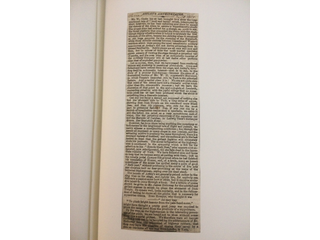Transcription
ASTLEY’S AMPHITHEATRE.
Mr. W. Cooke has at last brought to a close the long-[blurry] tale of “broil and battle” which, interrupted by short intervals, he has been unfolding ever since he caused the victory of the Alms to assume a hippodramatic shape. The proper time had arrived for a change, as, sooth to say, the broad platform that connected the circus with the state, though highly effective when it helped to celebrate the first triumph of the allies, became less striking when it remained as one huge gangway for the storming of the Malakhoff, while those circular contests between C[blurry] and Western warriors which were among the most conspicuous military manoeuvres at Astley’s did not derive advantage from increased familiarity. Battle pieces are all very well new and then, but in course of time the most martial spectator grows aweary of viewing the stage through a perpetual veil of smoke, and the nose even of an enthusiastic member of the Artillery Company will at least desire other perfume than that of exploded gunpowder.
Let us rejoice, then, that we have passed from continual cannon and musketry to occasional pistol-shots. Alma and Sabas[blurry] have retired from the stage, and Astley’s, devoting itself to a domestic interest—that is to say, to the story of a popular highwayman—becomes the scene of a dramatized version of Mr. W. H. Ainsworth’s Rookwood, in which Turpin’s immortal ride to York in the principal feature, And a capital piece it is! We are not quite sure that some of the scenes have not a dramatic course much older than Mr. Ainsworth’s romance; but we leave the discussion of that point to the archaeologist of Lambeth, contenting ourselves with the joyful tidings that an equestrian pieces has at least been produced which has about it something like a dramatic interest.
Can any one fancy second act composed of nothing else but the aforesaid ride to York, a long series of scenes, showing first Dick Turpin on his renowned mare Black Bess, and then his pursuers, who ride for the most part in grotesque fashion? Nay, if any one can y a stretch of imagination realize such a spectacle, we opine it will rise before his mind as a very monotonous sort of vision, like the perpetual recurrence of the sagacious cat and the Marqui of Carabase, in Ludwig Tieck’s burlesque drama, Der Gestiefelle k[blurry]er.
However, far from there being anything like monotony or tediousness in the lengthened tale of flight and pursuit, we rarely witness a more exciting exhibition; for, though the scenes all represent so many stages in one journey, and the actuating motive is precisely the same throughout, there is a constant variety of incident, and the audience are to the last incited to hope that the gallant fugitive will ultimately elude his pursuers. The moral indignation at the highwayman is smothered in the sympathy which is felt for his affection to his “Bonnie black Bess,” who appears now ex[blurry], now reinvigorated, will she falls dead in the immensity vicinity of York. We have followed man and horse so long that we become sorry at parting with them, just as the usually jovial Cowper felt grieved when we had finished his translation of Homer, and, of a truth, many an honest worshiper of the muses has spoiled many a quire of good “Bath post,” without producing in the course of five acts one situation half so tear=provoking as the scene of the br[blurry] highwayman, crying over his dead steed.
The laurels of Astley’s are generally gained rather in the ring than on the stage, and rightly too, for anybody exclusive talent to jump through a hoop. But a tribute of praise should be given to Mr. James Holloway for the spirited and gallant manner in which he plays the character of Dick Turpin. He speaks well, looks especially, and in the delineation of feeling he shows all the genius that is necessary for equestrian drama. Even Hotspur, who though it was
---“An easy leap
To pack bright honour from the pale-faced moon.”
might have thought a pretty good jump was required to pluck the same jewel from the precincts of a hippodrame.
By the way, as the highwayman is the interesting personage of the piece, we are bound not to close without something like a moral protest. We therefore warn all inexperienced [blurry] to be tempted by the achievements of Mr. Holloway into the [blurry] of highway robbery, that they may have the pleasure of closing their career by a ride on one horse all the way from London to York.
